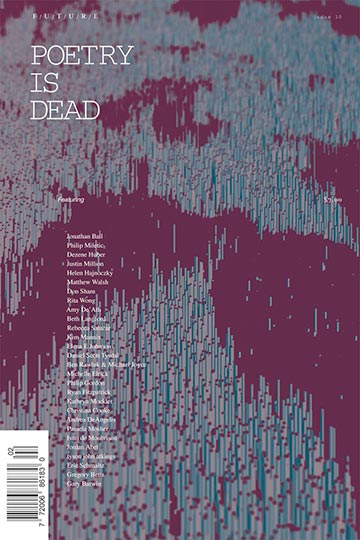
Introducing the latest poetry magazine to show its face in Canada—this one from Vancouver: it’s called Poetry Is Dead.
Irony abounds. For example, on page 1 we have a (moderately graphically altered) excerpt from John Donne’s 10th sonnet. Ironic because an avant garde poetry magazine is opening its doors with a work from the classical canon:
X.
DEATH, BE NOT PROUD, though some have called thee
MIGHTY AND DREADFUL, for thou art not so,
FOR THOSE, WHOM THOU THINK’ST thou dost overthrow,
DIE NOT, POOR DEATH, nor yet canst thou kill me.
Or as the editor, Daniel Zomparelli writes: “So poetry is dead but, like Elvis, there are sightings of it all around.”
Another irony is the very fact of a physical printed journal when the journal itself appears to harbour some small, small, small hostility towards “page poets” (people who sit at desks, often under the auspices of academic institutions, and write stuff that gets published in traditional volumes).
The journal sets up a debate between Betsy Warland and Chris Gilpin.
Warland is a “pages poet” who laments the dwindling numbers of poetry books published in Canada. However, the numbers she cites don’t support the view that poetry is dwindling in Canada—only that poetry’s proportionate share of published books is dwindling when measured against the growing number of fiction titles, which is a different proposition. However, her main beef is with spoken word or performance poetry: “Spoken word has grown in leaps and bounds; to my ear, however, the majority of writing performed is not deeply rooted in poetry. Instead, rap has taken up the reins and now speaks to a largely “non-literary” audience.”
Enter Chris Gilpin, whose credentials read as follows: “two-time member of the Vancouver Poetry Slam Team (2008 & 2009), the runner-up in the 2008 Vancouver Individual Poetry Slam competition, the champion of Vancouver’s 2008 Haiku Death Match and winner of the Vancouver’s 2009 CBC Poetry Face-off.” Gilpin is a champion of spoken word poetry. Gilpin writes:
Poetry slams let writers know that droning a series of oblique literary allusions in a monotone voice does not make you a refined poet — it makes you an insufferable bore. Art does not have to be painful and difficult. That impulse is just the toxic residue of puritanism at work again. Poetry should be enjoyable. Once poets embrace this, they will earn back that privileged placement in the bookstores and in the wider public sphere.
Wait a minute! Wait a minute! Stop!
This is déjà vu all over again. I’m sure I’ve heard these kinds of debates before. If only I could remember where. Oh wait. I know. I heard them in a seminary once when people were lamenting the growing view that religion is irrelevant. Enter the pundits who are sure they have the answer. Make church look more like TV—put up big screens and introduce fancy websites with interactive content, serve coffee, use everyday language. But after years of trying these fancy newfangled things, numbers are still down, the ledgers are in the red, and the pews are as empty as they ever were.
I don’t think the problem with poetry has anything to do with relevance, or debates between page poets and spoken word (both have a place), or debates about rehearsed and impromptu deliveries. In fact, I don’t think there’s a problem with poetry at all. If there’s a problem, it’s with the poet. We know what poetry is and we know what it can do. It has—and always will have—an important place in private reflection and public discourse. Like good religion, poetry speaks from the margins. A poet who aspires to “earn back that privileged placement” is, perhaps, missing something.
Change is all around us. But that change has nothing to do with the content or purpose of poetry. Instead, change challenges us to do what we’ve always done, but with new tools and to new audiences who are interested and want to be engaged. I think the people behind Poetry Is Dead understand this which accounts for the interesting discontinuity in a journal which, for example, discusses the digitally based phenomenon of flarf (with a reprint of the wikipedia entry for which PiD is responsible) but still clings to the traditional form of the physical volume.
In any event, PiD isn’t a journal of literary theory; most of the space is devoted to the poetry and reviews. For $7 an issue or $12 for a subscription, it’s well worth the money.
Update:
Poetry Is Dead! Is Dead
Publisher & Founder, Daniel Zomparelli, has announced that, after 10 years of good poetry, Issue #20 will be the last issue of Poetry Is Dead!
